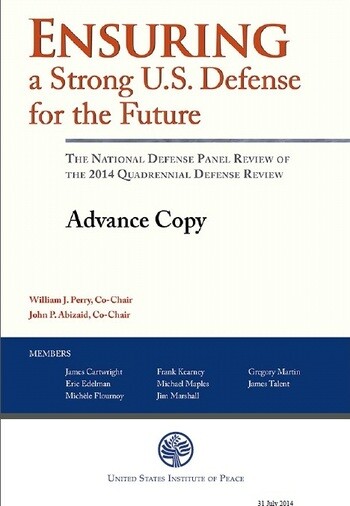hankyoreh
Links to other country sites 다른 나라 사이트 링크
US defense officials make recommendations for case of contingency on Korean peninsula

By Park Hyun, Washington correspondent
Former senior defense officials in the US called for Washington to communicate closely with Beijing in the event of a contingency situation on the Korean Peninsula.
The National Defense Panel (NDP), co-chaired by former Secretary of Defense William Perry and former Central Command commander John Abizaid, released a review on July 31 for the Defense Department’s Quadrennial Defense Review (QDR).
“One plausible contingency that would be among the most stressing for today’s Joint Force would be a war on the Korean peninsula or an internal crisis ending in the collapse of the North Korean regime,” the report stated.
The NDP is a non-partisan group of ten defense experts who meet at Congress’s request to review defense policy.
“[North Korean leader] Kim Jong Un has continued to consolidate power in part by engaging in brinksmanship with the Republic of Korea (ROK) and the United States,” the review said, adding that “deficiencies in North Korean conventional military capabilities have compelled Pyongyang to focus on its nuclear arsenal and ballistic missile forces.”
“Serious instability on the peninsula would require the United States to deploy substantial ground, air and maritime forces prepared for combined operations with ROK forces,” it continued.
The panel went on to outline four implications of a Korean Peninsula emergency in terms of military operations. First, it said the situation would require plans for the rapid movement of US ground forces stationed in Asia and at home to reinforce USFK and South Korean forces.
Second, it called for close communications with the Chinese political and military leadership to ensure a “shared picture of the operational environment and reduce the risk of miscalculation.”
Third, it said advanced planning would be needed to “quickly employ precision munitions against key targets in North Korea to achieve objectives, minimize civilian casualties and reduce prospects for nuclear escalation.”
Fourth, it mentioned the need for plans to secure nuclear, biological and chemical weapons and facilities to prevent them from falling into the hands of terrorists or hostile states.
The panel went on to say that the military capacities the Barack Obama administration listed as necessary in its March defense strategy review “clearly exceed” the amount available to the Department of Defense.
Noting the recent foreign policies of China and Russia, the nuclear policies of North Korea and Iran, and the situations unfolding in Iraq, Syria, other Middle Eastern countries, and Africa, the panel called the gap “disturbing if not dangerous.”
Please direct questions or comments to [english@hani.co.kr]

Editorial・opinion
![[Column] Has Korea, too, crossed the Rubicon on China? [Column] Has Korea, too, crossed the Rubicon on China?](https://flexible.img.hani.co.kr/flexible/normal/500/300/imgdb/original/2024/0419/9317135153409185.jpg) [Column] Has Korea, too, crossed the Rubicon on China?
[Column] Has Korea, too, crossed the Rubicon on China?![[Correspondent’s column] In Japan’s alliance with US, echoes of its past alliances with UK [Correspondent’s column] In Japan’s alliance with US, echoes of its past alliances with UK](https://flexible.img.hani.co.kr/flexible/normal/500/300/imgdb/original/2024/0419/2317135166563519.jpg) [Correspondent’s column] In Japan’s alliance with US, echoes of its past alliances with UK
[Correspondent’s column] In Japan’s alliance with US, echoes of its past alliances with UK- [Editorial] Does Yoon think the Korean public is wrong?
- [Editorial] As it bolsters its alliance with US, Japan must be accountable for past
- [Guest essay] Amending the Constitution is Yoon’s key to leaving office in public’s good graces
- [Editorial] 10 years on, lessons of Sewol tragedy must never be forgotten
- [Column] A death blow to Korea’s prosecutor politics
- [Correspondent’s column] The US and the end of Japanese pacifism
- [Guest essay] How Korea turned its trainee doctors into monsters
- [Guest essay] As someone who helped forge Seoul-Moscow ties, their status today troubles me
Most viewed articles
- 1[Column] The clock is ticking for Korea’s first lady
- 2Hong Se-hwa, voice for tolerance whose memoir of exile touched a chord, dies at 76
- 3[Column] Has Korea, too, crossed the Rubicon on China?
- 4After 2 months of delayed, denied medical care, Koreans worry worst may be yet to come
- 5[Correspondent’s column] In Japan’s alliance with US, echoes of its past alliances with UK
- 6All eyes on Xiaomi after it pulls off EV that Apple couldn’t
- 7[Photo] Smile ambassador, you’re on camera
- 8US overtakes China as Korea’s top export market, prompting trade sanction jitters
- 9S. Korea “monitoring developments” after report of secret Chinese police station in Seoul
- 1075% of younger S. Koreans want to leave country